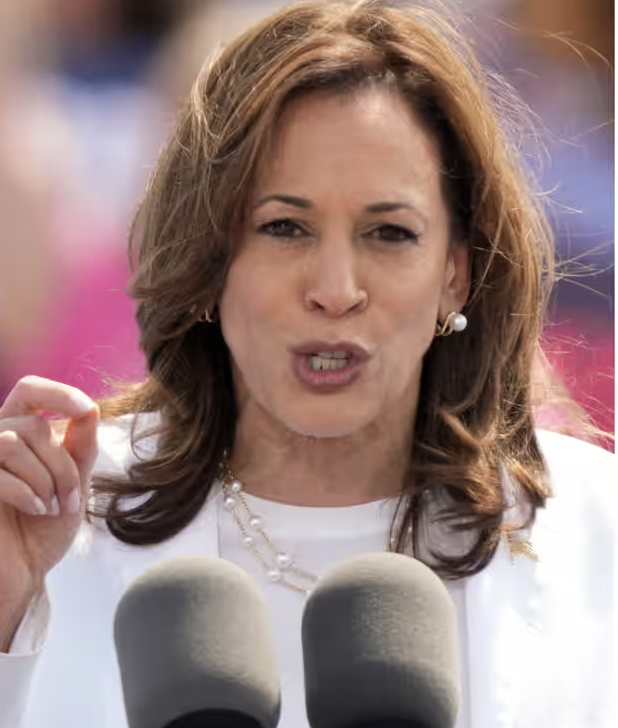Post #9: Kamala Harris: Who was She as California Attorney General?
August 2024
Who is she? Why should we care?
The election of 2024 has been messy, confusing, and uncertain. Today, I hope to provide a bit more clarity regarding one of the candidates: current Vice President Kamala Harris. As she served my home state of California, it will be interesting to see how her work as Attorney General might reflect how she would lead the nation if elected.
Early Career
Before being elected Attorney General, Harris began her political career in 1990, when she was elected deputy district attorney in Alameda County, CA. Four years later, she was appointed to the state Unemployment Insurance Appeals Board and California Medical Assistance Commission by Speaker of the California Assembly Willie Brown.
There was speculation at the time that the two were dating, but it is unconfirmed. Los Angeles Times writer Dan Morin said at the time that Brown was “rush[ing] to hand out patronage jobs while he retains his powerful post.”
In 1998, she served as an assistant district attorney and the chief of the Career Criminal Division. She used this experience when elected District Attorney (DA) of San Francisco in 2002.
As DA, Harris championed higher bail for defendants in gun-related crimes, created a Hate Crimes Unit, and condemned the death penalty. In 2006, she also prosecuted adults for student truancy in San Francisco, the first time in the city’s history.
As Attorney General:
Harris supported the National Mortgage Settlement, which made the five largest mortgage companies in the country provide $26 billion in relief to homeowners and to the state and federal government. She made an agreement with several large tech companies that apps sold in their stores would have robust and informative privacy policies.
Harris supported affirmative action. She also argued that Proposition 8, which stated marriage could exist solely between a man and a woman in California, was unconsitutional in an amicus curiae.
Cause of Controversy?
Overall, the hottest topic of debate in regards to Harris’ time as Attorney General is her policies on crime. As the former DA, there were high expectations of her in this area. In some respects, she made thoughtful changes, including the 2015 requirement for all police officers to wear body cameras.
However, what made her controversial were her positions on innocence cases as well as the infamous Proposition 47 (Prop 47).
Negligence of Prisoners?
In 2008, Harris’ office prosecuted Jamal Truelove for murder. It was discovered later that Trulove had been framed by the police. He served six years in prison before being released, and was paid a $13 million settlement. However, critics argue that Truelove’s prosecution should have been approved by Harris herself. A former attorney staffer said “the approval process was a rubber stamp, and it was highly unlikely she was familiar with the details.”
In 2010, she opposed DNA testing requested by the lawyers for Kevin Cooper, a death row inmate since 1985. Only in 2018, when the press began focusing on the case, did Harris push for testing. In a 2019 article, Lara Bazelon of the Appeal argued that “she weaponized technicalities to keep wrongfully convicted people behind bars rather than allow them new trials with competent counsel and prosecutors willing to play fair.” The DNA testing, however, proved Cooper’s guilt.
Proposition 47: Decriminalizing Crime
Harris’ office supported the passage of Prop 47, which was passed by voters in 2014. Prop 47 made non-violent property crimes where the value does not exceed $950 into misdemeanors, and made reductions from felonies to misdemeanors possible for offenses including grand theft crimes, possession of stolen property, commercial burglary, and others.
A former deputy director of parole for the California prison system said “Kamala Harris is not a hardliner [on crime]. Prop 47 couldn’t happen without the AG’s office support. Her support of it was literally critical.”
Furthering critics’ anger, a spokesperson for the Harris campaign told Fox News Digital in a statement that “Harris was a pragmatic prosecutor who successfully took on predators, fraudsters and cheaters like Donald Trump.”
What gives?
2017 – Harris’ final year as Attorney General – was seven years ago. However, three main things can reasonably be concluded from her previous work.
Firstly, Harris is a well-meaning supporter of benefits for low-income, at-risk Americans, particularly youth. This can be seen in her punishment of parents for truancy, formation of a Hate Crimes Unit as DA, her support of affirmative action, opposition to Prop 8, and support of Prop 47. This extends to the protection of average Americans’ privacy and safety, as seen in her support of gun restrictions and app privacy.
Secondly, although Harris is well-meaning, her work has been known to backfire. When it does, she leaves things unaddressed or goes back to her previous position. Take Prop 47, for instance; San Jose Mayor and other prominent California officials are calling for its removal because of how stores are forced to lock up valuable items, close earlier, and even permanently close stores in certain locations. Harris’ spokesperson glossed over the issue entirely. This was also seen in the case of Kevin Cooper.
Thirdly, Harris knows her way around the political landscape. From small beginnings in the 90s, she has worked her way through the system. For better or for worse, has impacted homeowners, criminals, small businesses, taxpayers, and US politics at large. The question that remains is whether her experience is lengthy, meaningful – and successful – enough to help our nation. That is up to you when you cast your ballot in November.
Image credits: Charles Rex Arbogast/AP
